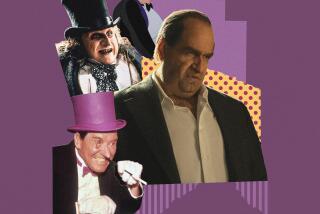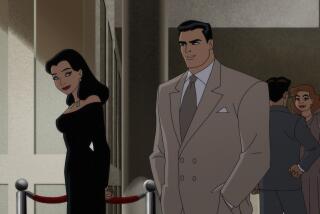Q&A: Frank Miller on the 30th anniversary of ‘Dark Knight:’ ‘Part of my job is to get your attention’
Frank Miller’s older, grizzled version of Batman has an iconic place among Dark Knight lore and is loosely the base upon which the upcoming “Batman v. Superman: Dawn of Justice” movie draws its inspiration. But the geriatric vigilante hasn’t retired the cape and cowl just yet; “Dark Knight III: The Master Race” book #3 hits shelves this week.
The new release is timed perfectly for the 30th anniversary of the bat book that started it all: “Batman: The Dark Knight Returns.” It stars an older Batman, whom Miller introduced alongside comic book artist Klaus Janson and colorist Lynn Varley, a dystopian future Gotham City and a lot of problems for the senior Bruce Wayne. The graphic novel was on the New York Times best-seller list and was named one of the top 10 graphic novels of all time.
In the new “DKIII,” written alongside Brian Azzarello with art by Andy Kubert, Miller continues the story of his retired Batman — one who barely escaped his latest mission if not for the help of another Robin. But retirement is always short-lived for Wayne, and a group of Kryptonians descends upon the planet to take it over. In order to save the planet, Batman must turn to the one being he’s never fully trusted: Superman.
Miller’s take on the relationship between these two heroes has always drawn interest, and as he prepared to address a group of overflowing fans at The Grove’s Barnes and Noble last Saturday in Los Angeles, that drawing power was on display.
Old friend and admirer Stan Lee even stopped by to pay homage to Miller, who was introduced to the crowd by DC executive Dan DiDio. The visit was unannounced, and the admiration between the two comics titans was palpable. Miller even took on Lee’s audience question — Who would win in a fight between Captain America and Batman? — with a friendly answer: “Robin.”
Before Miller addressed the crowd and signed what looked to be over a hundred personalized autographs, we were able to ask him a few questions about his current take on the Dark Knight, what he thinks of Batman on screen and why he named this series “The Master Race.”
Why did you want to come back to this particular version of Batman?
Batman is one of those wonderful characters that you can always return to. As times change, he’s got new problems to address. You can bring up the same old themes and tactics, but there’s always something new for Batman to do. Like any really good character, you can pull him a thousand different ways.
He had to take on Superman. Now he has to take on super men. He’s older than he was even in your first “Dark Knight” storyline. Is there a theme that you’re exploring with the character as he gets older and has to be even more cerebral?
Yeah. Partly it’s just about how people adapt to increasing age. My aim is to get across more and more the idea that he’s an epic hero. He’s the kind of hero who’s, in a way, eternally young. The old saying is that old heroes don’t die, they just fade away. Batman’s just too mean to fade away.
The mini comics inside, with the Atom and Wonder Woman and ...
Who could resist the idea of a mini comic with the Atom?
Seems fitting. Are there other heroes that you want to explore in the future and how they deal with aging?
Sure. There’s such rich material. Some move into adulthood and some move into middle age and some just become old, but they all become more interesting. I haven’t exactly got a list of ones we’re working on right now, but these are good characters. They’ve stood the test of time, and now, let’s see if they can stand time changing.
The “Batman vs. Superman” movie is not the same, obviously, as your original “Dark Knight” series, but it’s loosely based on what you’ve done. Have you seen it, and what do you think about the portrayals of characters like Batman onscreen?
I haven’t seen the movie, just the trailers — same as everyone else. As far as the portraits of heroes on the screen, I find them fascinating because they change with each passing generation. If you look at the portrayals of Batman, going from the 1940s serials, which were very much like pulp detective stories, Batman was running around solving things with his fists. He and Robin would come up against a bunch of hoods, and they would punch it out with them. They didn’t have any clever boomerangs or anything to fight with.
Then, as it moved into the ‘50s and into the ‘60s, the rejuvenation came with the Adam West TV show, which was a comedy. It played up the funny aspects and goofy villains. Then, just when you thought that one was locked and solid, the comics started moving in a completely different direction. Writers like Denny O’Neil and artists like Neal Adams and others turned Batman into a darker, more serious character.
Then, Hollywood, revisiting the character, picked up on those themes and advanced not only his age, but his personal intensity. So he was part of a much darker world, and I expect that to continue — one feeding off the other, both reacting to the world as it changes.
In terms of “DKIII,” there was some controversy with the name “The Master Race.” Those who’ve read it understand the Kandorian themes in it, but what was your thought process in terms of creating the title?
Part of my job is to get your attention. And one of the ways to get your attention is to come up with a title so startling that you think, ‘It can’t possibly mean what it sounds like.’ It’s not about Nazis. But on the other hand, what was Hitler’s horrible dream but a race of super men?
This will honestly be a race of super men foisted on human beings, and you’ve got to wonder what would happen if we had a bunch of super men flying around. Would we all of a sudden feel like Darwin had left us behind? Then we’d probably get a little nervous. I don’t think anybody would have the nerve to pick anybody’s pocket.
A broader comics question: It seems the theme in comics right now is diversity, and even redoing the history of some of comics’ most stalwart characters. What do you think about this and how it’s changing both what’s on the page and who’s creating the content?
It’s a normal, natural correction. There was a time when you picked up a Captain Marvel or a Superman comic and you’d see all these Asian villains. They’re not all Asian villains, but they were drawn in the most racist manner because our country was at war with Japan. These were unthinkably racist cartoons, and we’d never allow them now.
The times affect what we do. It isn’t that the people who drew those were themselves racist, but it’s what everybody was thinking. And so naturally, we try to fix what we’ve done in the past and do something better. That’s one of the reasons why, in the 1970s, when they wanted to introduce a new member of the Green Lantern Corp., they introduced John Stewart, who’s a black man, and changed the whole face of the Green Lanterns.
These are all good changes and needed to be made. It doesn’t mean that all the people who came before were horrible people. Times change, and we all grow up.
With your version of Batman, is there anything else that you want to see him do? He’s getting pretty old ...
There’s a whole lot! But I really don’t want to go into details. I hope to be showing you.
Follow me on Twitter: @Storiz
MORE:
Frank Miller is co-writing ‘Dark Knight III: The Master Race’
Time Warner hoping ‘Batman v. Superman’ can reverse Warner Bros. studio’s recent slump
Make way! Warner Bros. expands its universe with DC Super Hero Girls
More to Read
The biggest entertainment stories
Get our big stories about Hollywood, film, television, music, arts, culture and more right in your inbox as soon as they publish.
You may occasionally receive promotional content from the Los Angeles Times.











